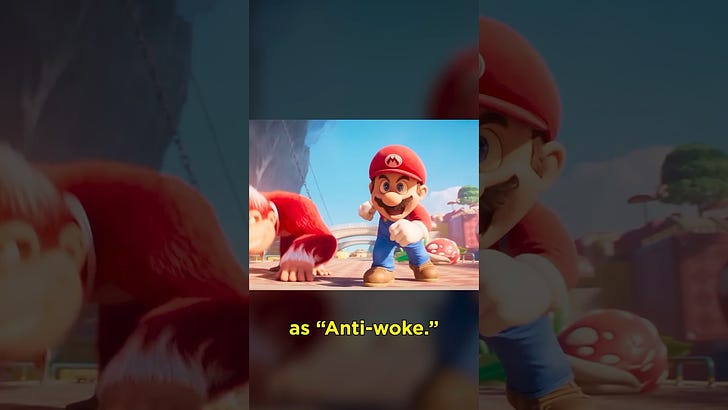In May, I asked a simple question: Is the new Super Mario Bros. movie really anti-woke?
Here was my answer:
Mario Bros. is a throwback flick. It takes viewers back to a happier time when our world wasn’t so politicized. I don’t think that makes the movie “anti-woke”—unless by anti-woke one simply means the absence of wokism.
There’s no climate message in Mario Bros. Princess Peach is still a white girl. Not one character explores an alternative sexuality, and there’s not a whisper of social justice. On the contrary, there’s a subtle message of individualism. Heroism, we see, is an internal process. It’s about overcoming ourselves—our shortcomings even (pun intended)—to do something extraordinary.
Is that anti-woke? Again, I don’t think so—unless the mere absence of woke messaging qualifies.
This of course invites a question: why then did the movie get labeled ‘anti-woke’?
After all, I went and saw the new Puss in Boots movie recently, as well as Guardians 3. Neither of those movies had anything I’d describe as “woke” in them, yet they didn’t get labeled anti-woke.
The answer is pretty simple, I think, and it stems from actor John Leguizamo.
Leguizamo starred in the original Mario Bros. movie, which was pretty terrible, and apparently he got pissed off over the studio’s decision to cast Chris Pratt and Charlie Day as Mario and Luigi, respectively—because Pratt and Day are both white.
“No I will not [be watching]. They could’ve included a Latin character,” said Leguizamo, when asked about the movie. “Like I was groundbreaking and then they stopped the groundbreaking. They messed up the inclusion.”
It’s a cringey statement that reeks of sour grapes and pettiness, which helps explain why it went viral. And when the new movie smashed it at the box office, people who hate woke ideology seeping into movies (and beyond) made a point of letting people know about it.
I bring all this up again for two reasons.
First, my FEE colleagues Abby Richardson and Matt Tabor put together a YouTube short of the story and I wanted to share it. (The video is fantastic and getting some massive traffic. It was approaching a million views as I was typing up this article.)
Watch it and let me know what you think.
Secondly, you can count me as one of the people who really doesn’t like woke ideology in movies. I know a lot of people say that nobody can describe what woke is, but I don’t think it’s very complicated. Here is how I define it.
Woke: Social justice, intersectionality, and neo-Marxism masquerading as compassion for the poor and oppressed.
I think this is a terrible way to view the world. And it’s making our movies worse!
Yes, this last part really does bother me. And I’m not alone. The great actor Richard Dreyfuss appeared on PBS’ Firing Line and told Margaret Hoover that the Academy’s new diversity requirements for films to be Oscar eligible make him want to “vomit.”
“This is an art form,” Dreyfuss continued. “It’s also a form of commerce, and it makes money, but it’s an art. And no one should be telling me as an artist that I have to give in to the latest, most current idea of what morality is.”
The Jaws actor is exactly right. Art can be a vessel for ideas and morality, which is what makes it so powerful and moving. But nothing destroys art faster than shoving ideology and morality into it, or making it a vehicle to advance dogmas.
Moreover, social justice and intersectionality might be the zeitgeists of the moment, but they are not the positive forces proponents of them would have you believe.
These are toxic ideologies created by people with very bad ideas; they are corrosive not just to societies but to individuals. And they’ve conditioned people into seeing the world through the prism of oppressed and oppressor—not as individuals.
So next time someone asks you to define woke, have an answer ready—Woke: Social justice, intersectionality, and neo-Marxism masquerading as compassion for the poor and oppressed.
You don’t even need to cite me.




Great definition of wokeism. The compassion part is key. Even though these ideas are largely destructive, they gain traction because people want to be seen as caring.
One of the characteristics of Marxism generally is that it deliberately tries to politicize everything. So if you find yourself in a world were even movies made for simple entertainment have political messaging built in, you know that Marxist ideology has influenced the film.